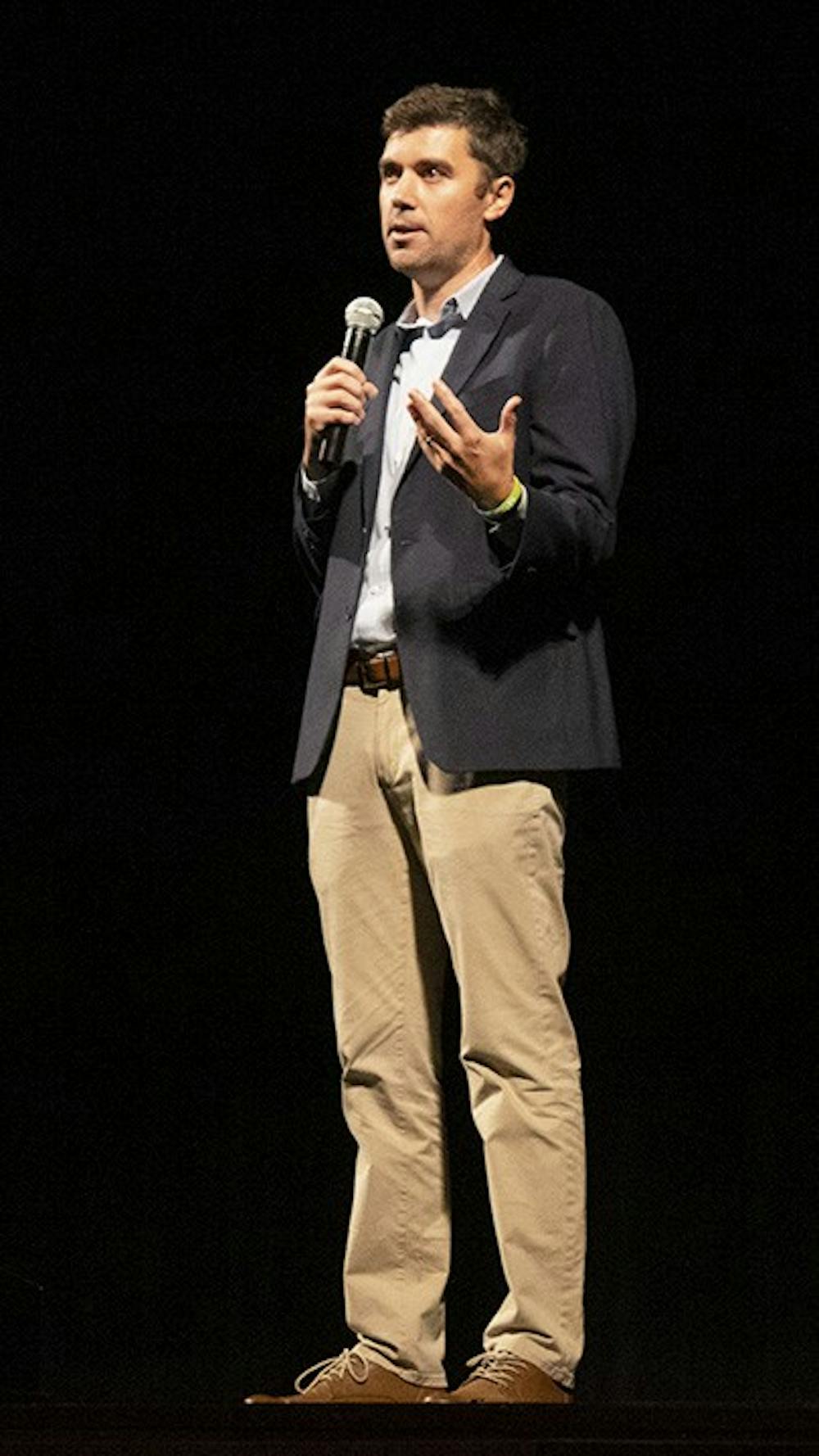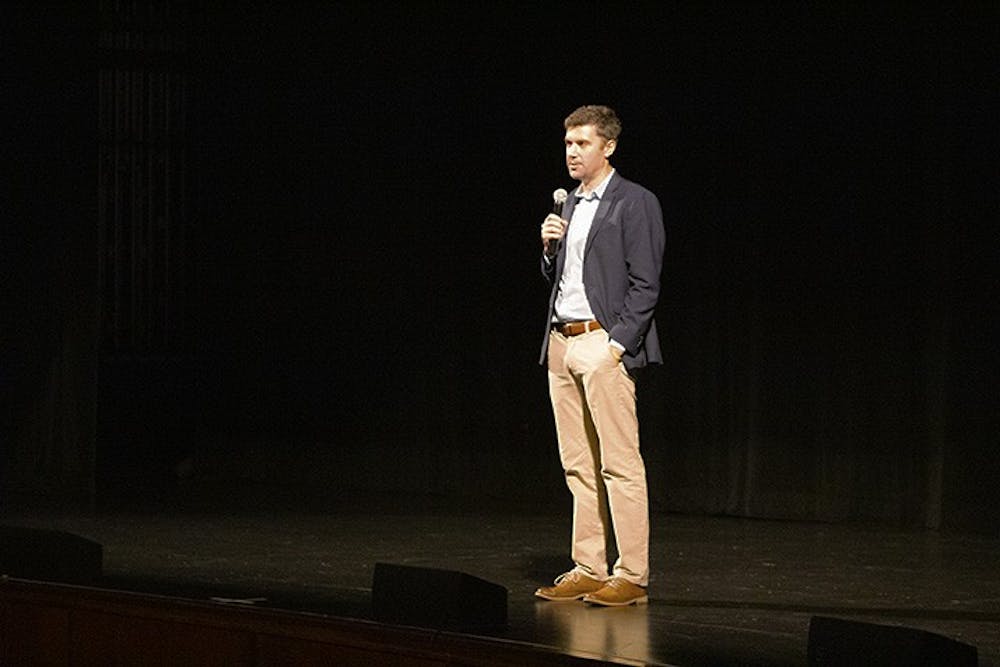Can an avowed racist learn to appreciate and love those he once irrationally hated?
That is what Pulitzer Prize-winning Washington Post reporter Eli Saslow spent years trying to learn about one of the most prominent members of the white supremacist movement in America.
Saslow spoke of that journey as the keynote speaker for the Shippensburg University community’s continued celebration of its “Week of Human Understanding” on Wednesday at the H. Ric Luhrs Performing Arts Center.
The evening kicked off with a brief introduction and welcome from the representative of the Day of Human Understanding Committee, Daniel Velez, who is SU’s chief equity, inclusion and compliance officer and Title IX coordinator.
“At Ship, we believe in fostering a welcoming community where deep civility manifests,” Velez said.
“As we come together as a Ship family, I encourage you to lean into discomfort. To experience what you hear as an opportunity to challenge your world view through the lenses of another’s experiences,” Velez said. “Experiences that may be radically and fundamentally different than your own.”
Velez introduced SU senior and editor-in-chief of The Slate Jonathan Bergmueller, who introduced the evening’s topic, civil discourse and speaker to a nearly full Grove Theatre.
Bergmueller stressed the important role everyone can play in civil discourse.
“… It is down to us — the people who believe in equality — to bring compassionate, civil discourse to these people,” he said. “To, once more, civilly, challenge their beliefs. Help them see the error of their ways not by arguing, but by doing.”
Bergmueller referred to his work as a student journalist, explaining how journalism allows him to learn more about the world.
“I get to experience others’ interesting lives through my own. It’s about hearing other people. It’s about feeling what they feel. I would be lying if I said I didn’t learn much about myself and the world around me through listening to others, even those I don’t always agree with,” he said.

Saslow, the featured speaker of the evening, focused his address on both his experiences and discoveries while writing “Rising Out of Hatred: The Awakening of a Former White Nationalist” and describing the experiences of the main character, Derek Black.
He explained how Black was raised by Ku Klux Klan leader Don Black and was known as “the heir to America’s white nationalist movement.”
Black was heavily influenced by white nationalist culture, spending his childhood attending — and eventually speaking at — white nationalist conferences, according to Saslow.
Saslow said Derek left this cocoon of white nationalism, where he had been living his life, when he was 21 years old and enrolled at the New College of Florida — a school with an ideology much different than his own.
Black interacted with his peers “as a normal student,” while secretly participating in a daily white nationalist-valued radio show with his father, said Saslow.
He interacted with the campus community decently, as “he never believed that it was appropriate or effective to be interpersonally hateful, he thought you should interact with everybody decently,” according to Saslow.
Black lived the double life until another student found a photo of the student who he sat next to in religion class — Black — on the Southern Poverty Law Center website.
The campus descended into a debate, “What do you do when you’re surrounded with hateful ideas, hate speech and with the kind of racism that makes you uncomfortable or sick? How do you confront that? How do you deal with that?” Saslow asked.
However, nobody made the choice to do nothing, he said.
Saslow explained how students reacted in different ways including confronting Black, ostracizing him, turning their back to him and dropping classes that he was registered for, in protest of his ideology.
As a result of this, Saslow said Black for the first time in his life began to doubt his ideology. He had never spent time with the victims of his prejudices and had never seen how his ideas impacted them.
After a period of isolation, two Jewish students reached out to Black, inviting him over for a Friday night Shabbat dinner.
“They thought, ‘If we can begin to be people to him, he can start to challenge some of the ideas he has,” said Saslow.
After weeks of dinners, the campus community began noticing.
“How could somebody who was saying these awful things also be capable of being nice and kind to the people he was prejudicing all the time?” Saslow explained.
More students began to attend the dinners and share their own experiences, Saslow said.
Saslow explained how Black began to see the damage he had done.
“Pieces of Derek’s ideology began to fall apart. He began to believe that he was wrong about just about everything,” Saslow said.
After graduating college, Black planned to tell his parents that he thought everything he was told growing up was nonsense, but Saslow said he “chickened out.”
Instead of telling them directly, Saslow said Black wrote a three-page letter apologizing for what he had done and eventually changed his name and moved across the country to fight against the cause he supported for the first 22 years of his life.
“Every day he [Black] wasn’t fighting back against it, he was allowing that damage to continue to spread,” Saslow said. “It’s a choice he continues to make again and again and again.”
The Pulitzer Prize-winning journalist closed his remarks by sharing his newfound hope through telling Black’s story.
“If the future heir to this racist movement can migrate so far to the other side, it gives me hope,” Saslow said.
He challenged the audience to participate in civil discourse. “If we let the status quo continue, in the United States we are emboldening racist ideas,” said Saslow.
Following Saslow’s address, audience members asked questions to further the discussion. They were invited to continue the conversation through a debriefing conversation held Thursday afternoon in the Ceddia Union Building.


The Slate welcomes thoughtful discussion on all of our stories, but please keep comments civil and on-topic. Read our full guidelines here.